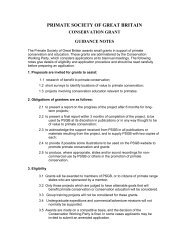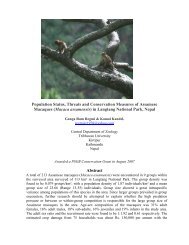2010 Vol 101.pdf (1.63mb) - Primate Society of Great Britain
2010 Vol 101.pdf (1.63mb) - Primate Society of Great Britain
2010 Vol 101.pdf (1.63mb) - Primate Society of Great Britain
Create successful ePaper yourself
Turn your PDF publications into a flip-book with our unique Google optimized e-Paper software.
integration as a promoter <strong>of</strong> social success (support), measured by level <strong>of</strong><br />
integration in the group and level <strong>of</strong> stress exhibited. Female capuchins (n =<br />
6) are members <strong>of</strong> two separate (East and West) but environmentally similar<br />
groups <strong>of</strong> captive female capuchin monkeys (Cebus apella) housed at the<br />
Living Links to Human Evolution research centre at Edinburgh Zoo.<br />
Behaviour such as grooming (given and received), time spent alone or with<br />
group members, dominance and scratching (as a measure <strong>of</strong> stress) were<br />
documented by both scan and focal methods. Social integration was<br />
calculated by mean time spent alone or with others. Statistical analysis<br />
revealed significance between level <strong>of</strong> integration and the percentage <strong>of</strong><br />
time spent grooming others. All other analyses were non-significant;<br />
however, mean amounts <strong>of</strong> scratching were lower when percentage <strong>of</strong> time<br />
spent grooming was higher; also level <strong>of</strong> social integration illustrated some<br />
relevance to rank position and amount <strong>of</strong> time spent grooming. To<br />
conclude, this suggests that grooming is a commodity traded for a central<br />
position in the group, to reduce stress, as well as to maintain rank position.<br />
Bonobos (Pan paniscus) use copulation calls as a social signal<br />
Z. Clay and K. Zuberbühler<br />
Department <strong>of</strong> Psychology, University <strong>of</strong> St Andrews<br />
Females <strong>of</strong> many primate species produce distinct vocalisations known as<br />
‘copulation calls’ during mating events. Typically, copulation calls are<br />
produced during heterosexual matings and thus their adaptive significance<br />
is considered to be for promoting reproductive success. However, in<br />
bonobos (Pan paniscus), females regularly engage in homosexual as well as<br />
heterosexual matings and produce copulation calls in both contexts. The<br />
way in which copulation calls have become detached from their biological<br />
function in bonobos challenges theories explaining these calls as purely<br />
reproductive strategies. In the current study, we examined bonobo<br />
copulation calling behaviour to investigate how females use these<br />
vocalisations as tools to pursue certain social and reproductive goals. We<br />
recorded copulation calls produced by mature females at Lola Ya Bonobo<br />
Sanctuary, DRC, during both homosexual and heterosexual interactions.<br />
Acoustic analyses revealed considerable similarity in the acoustic structure<br />
<strong>of</strong> copulation calls produced in both contexts. Furthermore, whilst females<br />
called more during heterosexual copulations, we found that copulation calls<br />
were used similarly in both contexts. For both homo- and heterosexual<br />
copulation calls, we observed strong effects <strong>of</strong> relative dominance rank,<br />
with low-rank females calling more with higher-ranked partners. In<br />
homosexual matings, the identity <strong>of</strong> the initiator also predicted calling. Our<br />
results suggest that bonobos use copulation calls as social signals to express<br />
social status and to advertise bonding relationships. Thus, rather than being<br />
restricted to purely reproductive contexts, copulation calls in bonobos<br />
appear to have assumed a greater social significance.<br />
21






